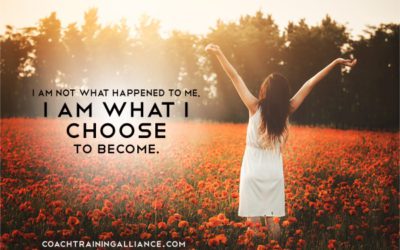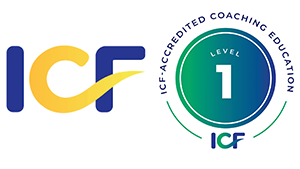For many of us, our ultimate goal is to become a masterful coach so that when we are working with our clients (employees, colleagues, team members), we feel capable, confident and connected not just to the person we are coaching but to our intuition. So, what are the 5 habits that create that confidence? And how can you start bringing those 5 habits into your practice?
#1 ACKNOWLEDGE YOUR VALUE.
Number one is to acknowledge your value. It doesn’t come naturally to recognize your worth, but it is something that you can grow into, consciously. When I first started coaching, I used coaching to help individuals figure out how they were going to get a project done or better manage their time. Initially, I used coaching as just another tool in my tool kit to help people figure out how to solve a particular challenge. While I thought it was great that I could help my clients come up with their own solutions, I didn’t fully understand the impact it had. But as I started to experience coaching more (as a client and a coach), I discovered there was more value in these coaching sessions than I realized.
Fast forward to today…..
I absolutely stand by the value of coaching and my value as a coach. We serve to hold space for others, to allow them to become fully thinking and emotional human beings, to bring what is lurking in the subconscious forward and once it’s there, we support our clients to take action. I have witnessed the personal and professional growth that has come about because of coaching sessions. Finding solutions, solving challenges and creating opportunities is great; but to me, the biggest value is the personal development that happens. Coaching helps human beings develop their capability and trained coaches help people grow. So, to be a confident coach, know your value and know the value of your coaching sessions.
#2 TRUST YOUR EXPERTISE.
Number two, trust your expertise. Like many new coaches, when I first started coaching my team, I would come away from my coaching conversations feeling disappointed that I didn’t come up with the absolute best question to ask or perhaps wondering if I missed some clue during the session that might have held the opportunity for a mind-shifting Ah-ha moment. While the people I coached would let me know how helpful each session was, I knew that the sessions were not as good as they could be. At times, I even doubted if I was good enough.
During this initial phase of self-doubt, I was so focused on the skills and capabilities I lacked that I lost sight of my own unique expertise that I could bring to my sessions. How could I fully show up for my client when I was internally focused on my own short comings? Eventually, I realized that there’s something special and unique about each and every one of us and that we are at our best when we draw upon those strengths and talents. Some coaches like to integrate their background in psychology or behavior sciences. I like to integrate what I know about business and career transitions. I also love drawing upon my experience in sports and using symbolism and analogies as I communicate. I show up with an enthusiastic and optimistic energy. I bring all of that into my coaching sessions, and those are my natural talents.
Now, you might be someone who easily distinguishes speech patterns, pitch or cadence. You might be someone who is really good at picking up on shifting energy, so your natural talent is seizing the coachable moment around those shifting emotions. Or maybe your natural talent is that you create short powerful questions that help your clients gain crystal clarity.
So, to be a confident coach, you need to know and trust your own expertise. Don’t think, “I’m not good enough because I’m not great at reflecting back to the client,” or “I’m not intuitive enough.” Know that your talents are enough and draw upon them naturally. Doing this will allow you to show up fully for your client. Confident coaches focus on what they are great at and what makes a coaching session with “them” special and unique. Number two is trust your expertise.
#3 GET CENTERED.
Now, I’m going to be honest with you. Not all confident coaches meditate. But the third habit of a confident coach is honing their ability to clear the mind, tune into their client and be fully present. In order for you to really connect with your clients every time you coach and respond intuitively, it’s incredibly important that you know how to turn shut down your brain-chatter and hold space for your client. For some, this comes naturally. Others may find they need a bit of practice. Getting centered is a tried-and-true way that coaches can show up blank to a client session. For me, I like to do a few cycles of square breathing (inhale 4 counts, hold 4 counts, exhale 4 counts and hold the exhale 4 counts, repeating the cycle 2 or 3 times). This simple exercise helps me quiet my mind and set my focus. You may prefer to stare at a photo, gaze at a candle or simply close your eyes and let your thoughts move through your mind like a smooth flowing river. Regardless of what method you choose, create a daily practice of clearing the mind. If you begin a coaching session with background noise in your mind (email, reports, judgements, your own ideas, to do list) and you haven’t taken the time to pause and clear out first, then your coaching session is not going to be as good as it could be. Employ the practice of getting centered each day, however that works best for you, so that skill comes to you easily when you’re about to do a coaching session. Habit #3: get centered.
#4 GET RID OF THE TIP SHEET.
I know, it’s ironic that one of the items on the tip sheet is ‘Get rid of the Tip Sheet’. When I was first starting out, I kept a list of Powerful Questions right next to me during every coaching sessions. If I wasn’t sure what to ask, I would look down at my list and pick one that seemed most appropriate. Looking back, I can see how these questions were a bit like training wheels giving me a sense of security and providing the opportunity to try out a few variations until I found my own voice. In some ways they helped me get started and in other ways they held me back.
It’s a wonderful thing if you can ditch the tips/tools during the coaching session and learn to trust your intuition. Even though you might build a clumsy version of a question, what you gain is the ability to connect much more deeply with your client. You will see it come out in your coaching sessions in really beautiful ways. You will also learn to improvise and respond intuitively which will make your sessions more powerful and develop your skills more quickly. Not quite ready to fly without a net? If you still use tips and cheat sheets during your coaching session, be willing to coach without relying on them for one or two sessions. You will quickly realize you have the skills to do it on your own. You might also quickly realize any gaps in your training. Have you forgotten a specific technique? Is there a skill you need to polish? When you refer back to your training materials, try and do what confident coaches do and reference these tips outside of the coaching session. The only exception to this rule would be using a coaching model (at Coach Training Alliance we use The Simple Coaching Model). The coaching model provides a framework for your coaching conversations; we use the same model with every single coaching session. Having the Simple Coaching Model front and center is a great way to ensure your coaching conversations are productive and stay on track. So, the next time you have a coaching conversation- ditch the Tip Sheet, show up authentically and respond intuitively to your client.
#5 BE CURIOUS.
The final habit of a confident coach is being curious. We have people coming into our Coach Training Programs – some of them have been coaching informally for 10-15 years-and they bring with them a learning mindset where they are open to new possibilities, willing to explore new perspectives and are able to go even deeper in their training. As coaches, we can always go deeper in our training and integrate this new capability or perspective in our coaching sessions. However, lifelong learning isn’t only about acquiring knowledge, skills or polishing techniques (although those will certainly help you become a more capable coach), we are constantly presented with informal learning opportunities. For me it is both enlightening and rewarding to ask, “What did you find most valuable today?” I love this question because it serves to reinforce for the client what they got out of the session and helps me gain a better understanding of how the session (and which parts) impacted my client the most. More to the point, confident coaches are curious. They continually learn about themselves, learn about their value, appreciate the wisdom of their clients and because of this are able to sponge up an abundance of thoughts, perspectives, ideas, and discoveries as they co-create and collaborate. Learning is about being genuinely interested, curious, and willing to explore something new. “How would this training make me a better coach?” “What would happen if I tried this approach?” “Where does this client really want to go?” Being curious opens the possibility for coaches to develop through the many formal and informal learning opportunities around them.
So, number 5: Be Curious.
WRAP-UP
In summary, those are the 5 habits of Confident Coaches. Hopefully these habits will serve you well as you forge ahead helping your clients:
- Acknowledge your value.
- Trust your expertise.
- Get centered.
- Get rid of the Tip Sheet.
- Be Curious.
Do those 5 things, and you will quickly become a confident coach. Amazing things will happen for you because you’ll be putting yourself out there in such a powerful way and helping and serving so many people while trusting your intuition and giving value.
About the Author: Holly Hutchinson is a Certified Human Capital Coach and Wellness Coach who has been practicing since 2008. Holly’s passion is positive growth and lifelong learning. Her experience includes international trade and marketing as well as system sales into the Fortune 500. Holly’s focus at CTA is the growth of emerging programs for trade associations, organizational coaching deployment and CTA’s yoga programs. In addition to her work at CTA, Holly is a competitive athlete and serves on several non-profit boards. Holly is married with 2 children and is a graduate of the University of California at Berkeley.









